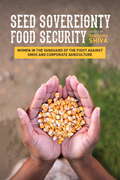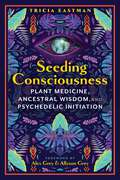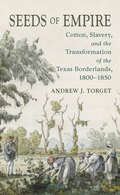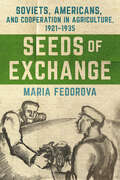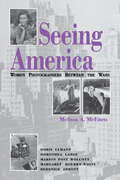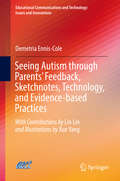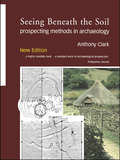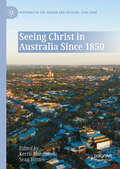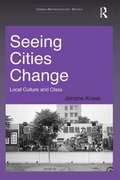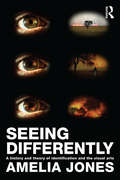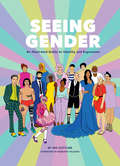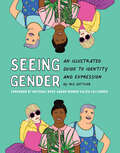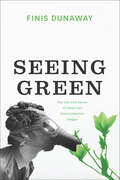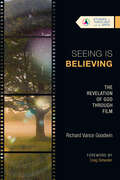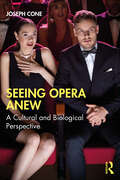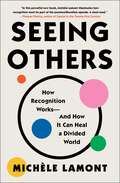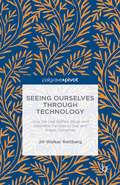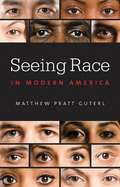- Table View
- List View
Seed Libraries: And Other Means of Keeping Seeds in the Hands of the People
by Cindy ConnerHistorically, seed companies were generally small, often family-run businesses. Because they were regionally based, they could focus on varieties well-suited to the local environment. <P><P>A Pacific Northwest company, for example, would specialize in different cultivars than a company based in the Southeast. However the absorption of these small, independent seed businesses into large multinationals, combined with the advancement of biotechnology resulting in hybrids and GMO seeds, has led to a serious loss of genetic diversity. The public is now at the mercy of the corporations that control the seeds.In the past few years, gardeners have realized the inherent danger in this situation. A growing movement is striving to preserve and expand our stock of heritage and heirloom varieties through seed saving and sharing opportunities. Seed Libraries is a practical guide to saving seeds through community programs, including: Step-by-step instructions for setting up a seed library A wealth of ideas to help attract patrons and keep the momentum going Profiles of existing libraries and other types of seed saving partnershipsWhoever controls the seeds controls the food supply. By empowering communities to preserve and protect the genetic diversity of their harvest, Seed Libraries is the first step towards reclaiming our self-reliance while enhancing food security and ensuring that the future of food is healthy, vibrant, tasty, and nutritious.Cindy Conner is a permaculture educator, founder of Homeplace Earth and producer of two popular instructional gardening DVDs. She is also the author of Grow a Sustainable Diet.
Seed Sovereignty, Food Security
by Vandana ShivaIn this unique anthology, women from around the world write about the movement to change the current, industrial paradigm of how we grow our food. As seed keepers and food producers, as scientists, activists, and scholars, they are dedicated to renewing a food system that is better aligned with ecological processes as well as human health and global social justice. Seed Sovereignty, Food Security is an argument for just that--a reclaiming of traditional methods of agricultural practice in order to secure a healthy, nourishing future for all of us. Whether tackling the thorny question of GMO safety or criticizing the impact of big agribusiness on traditional communities, these women are in the vanguard of defending the right of people everywhere to practice local, biodiverse, and organic farming as an alternative to industrial agriculture.Contents* Seed Sovereignty, Food Security VANDANA SHIVA * Fields of Hope and Power FRANCES MOORE LAPPÉ & ANNA LAPPÉ * The Ethics of Agricultural Biotechnology BETH BURROWS * Food Politics, the Food Movement and Public Health MARION NESTLE * Autism and Glyphosate: Connecting the Dots STEPHANIE SENEFF * The New Genetics and Dangers of GMOs MAE-WAN HO * Seed Emergency: Germany SUSANNE GURA * GM Soy as Feed for Animals Affects Posterity IRINA ERMAKOVA & ALEXANDER BARANOFF * Seeds in France TIPHAINE BURBAN * Kokopelli vs. Graines Baumaux BLANCHE MAGARINOS-REY * If People Are Asked, They Say NO to GMOs FLORIANNE KOECHLIN * The Italian Context MARIA GRAZIA MAMMUCINI * The Untold American Revolution: Seed in the US DEBBIE BARKER * Reviving Native Sioux Agriculture Systems SUZANNE FOOTE * In Praise of the Leadership of Indigenous Women WINONA LADUKE * Moms Across America: Shaking up the System ZEN HONEYCUTT * Seed Freedom and Seed Sovereignty: Bangladesh Today FARIDA AKHTER * Monsanto and Biosafety in Nepal KUSUM HACHHETHU * Sowing Seeds of Freedom VANDANA SHIVA * The Loss of Crop Genetic Diversity in the Changing World TEWOLDE BERHAN GEBRE EGZIABHER & SUE EDWARDS * Seed Sovereignty and Ecological Integrity in Africa MARIAM MAYET * Conserving the Diversity of Peasant Seeds ANA DE ITA * Celebrating the Chile Nativo ISAURA ANDALUZ * Seed Saving and Women in Peru PATRICIA FLORES * The Seeds of Liberation in Latin America SANDRA BAQUEDANO & SARA LARRAÍN * The Other Mothers and the Fight against GMOs in Argentina ANA BROCCOLI * Seeding Knowledge: Australia SUSAN HAWTHORNE
Seeding Consciousness: Plant Medicine, Ancestral Wisdom, and Psychedelic Initiation
by Tricia Eastman• Provides a blueprint for responsible and effective use of psychedelics and plant medicines to transform pain and trauma into profound connections with ourselves, nature, and the spirit world• Shares exercises to help readers plant the seeds of transformation in their own consciousness, navigate altered states of consciousness and ego death, work with the shadow, and integrate fragmented parts of the self• Explores ancestral teachings on the interconnectedness of all life, drawing on the author&’s studies with indigenous elders, including Bwiti initiations with ibogaPresenting a deep dive into the world of psychedelic initiation and ancestral wisdom, Tricia Eastman demonstrates the power of plant medicine and psychedelic journeys for cultivating new beliefs, healing trauma, and accessing latent gifts within us—an inner alchemical process she calls &“seeding consciousness.&”Drawing on her studies with Indigenous elders, including two decades of iboga initiations with the Bwiti of Gabon, Africa, and training with the Kogi Kággaba of Columbia, Eastman provides a blueprint for responsible and effective use of entheogens to transform pain and trauma into profound connections with ourselves, nature, and the spirit world. She explores ancient teachings on the interconnectedness of all life and the forces of nature and shows how colonization and modern culture have disconnected us from our spiritual foundations. She shares exercises to help readers seed their own consciousness, navigate altered states of consciousness and ego death, work with the shadow, and integrate fragmented parts of the self. She also examines how to respectfully engage with these potent transformative plants, substances, and ancient traditions, thereby honoring the wisdom keepers who have safeguarded these traditions across the millennia.Revealing how to prepare the fertile soil of the mind for mystical experience, this book presents a psychedelic path to awakening that simultaneously facilitates personal transformation and collective societal change.
Seeds
by Annabel SoutarPart courtroom drama and part social satire, Seeds presents an intelligent portrait of farming and scientific communities in conflict and at the same time penetrates the complex science of genetically modified crops. The play documents the 2004 Supreme Court of Canada showdown between Saskatchewan farmer Percy Schmeiser and biotech multinational Monsanto Inc., a David-and-Goliath struggle that cast Schmeiser as the small-farmer underdog fighting the unscrupulous major corporation. Monsanto accused him of growing their genetically patented Round-up Ready canola seeds on his property without paying the licensing fee they require. Through a suspenseful labyrinth of legal conflicts regarding patent rights, scientific showdowns about GM food and property clashes between farmers and the biotechnology industry, Seeds asks the essential question: "Can you patent a living thing?" Or as Schmeiser famously asked, "Who owns life?"A most interesting aspect of the play is the ambiguity around the hero Percy Schmeiser. Is he a victim or an opportunist and self-publicist? Certainly, he's no innocent; as he keeps telling us, he's an experienced politician, in fact an ex-mayor. He's a believer who knows how to frame his beliefs to advantage. He can be grand and he can be petty - and as such he is antihero as much as hero.Named the top play of the decade by Rover Arts in its review of English theatre in Montreal between 2000 and 2010, Seeds takes us back to the seminal moment when a single farmer stood up to international agribusiness and almost won.Cast of 4 women and 3 men.
Seeds of Empire: Cotton, Slavery, and the Transformation of the Texas Borderlands, 1800-1850 (The David J. Weber Series in the New Borderlands History)
by Andrew J. TorgetBy the late 1810s, a global revolution in cotton had remade the U.S.-Mexico border, bringing wealth and waves of Americans to the Gulf Coast while also devastating the lives and villages of Mexicans in Texas. In response, Mexico threw open its northern territories to American farmers in hopes that cotton could bring prosperity to the region. Thousands of Anglo-Americans poured into Texas, but their insistence that slavery accompany them sparked pitched battles across Mexico. An extraordinary alliance of Anglos and Mexicans in Texas came together to defend slavery against abolitionists in the Mexican government, beginning a series of fights that culminated in the Texas Revolution. In the aftermath, Anglo-Americans rebuilt the Texas borderlands into the most unlikely creation: the first fully committed slaveholders' republic in North America. Seeds of Empire tells the remarkable story of how the cotton revolution of the early nineteenth century transformed northeastern Mexico into the western edge of the United States, and how the rise and spectacular collapse of the Republic of Texas as a nation built on cotton and slavery proved to be a blueprint for the Confederacy of the 1860s.
Seeds of Exchange: Soviets, Americans, and Cooperation in Agriculture, 1921–1935 (NIU Series in Slavic, East European, and Eurasian Studies)
by Maria FedorovaSeeds of Exchange examines the US and Soviet exchange of agricultural knowledge and technology during the interwar period. Maria Fedorova challenges the perception of the Soviet Union as a passive recipient of American technology and expertise. She reveals the circular nature of this exchange through official government bureaus, amid anxious farmers in crowded auditoriums, in cramped cars across North Dakota and Montana, and by train over the once fertile steppes of the Volga. Amid the post–World War I food insecurity, Soviet and American agricultural experts relied on transnational networks, bridging ideological differences. As Soviets traveled across the US agricultural regions and Americans plowed steppes in the southern Urals and the lower Volga, both groups believed that innovative solutions could be found beyond their own national borders. Soviets were avidly interested in American technology and American agricultural experts perceived the Soviet Union to be an ideal setting for experimenting with and refining modern farm systems and organizational practices. As Seeds of Exchange shows, agricultural modernization was not the exclusive domain of Western countries.
Seeing America: Women Photographers Between the Wars
by Melissa A. McEuen“This vibrant and penetrating study. . . . opens a window on American culture between the world wars.” —Publishers WeeklySeeing America explores the camera work of five women who directed their visions toward influencing social policy and cultural theory. Taken together, they visually articulated the essential ideas occupying the American consciousness in the years between the world wars.Melissa McEuen examines the work of Doris Ulmann, who made portraits of celebrated artists in urban areas and lesser-known craftspeople in rural places; Dorothea Lange, who magnified human dignity in the midst of poverty and unemployment; Marion Post Wolcott, a steadfast believer in collective strength as the antidote to social ills and the best defense against future challenges; Margaret Bourke-White, who applied avant-garde advertising techniques in her exploration of the human condition; and Berenice Abbott, a devoted observer of the continuous motion and chaotic energy that characterized the modern cityscape.Combining feminist biography with analysis of visual texts, McEuen considers the various prisms though which each woman saw and revealed America.Winner of the 1999 Emily Toth Award for the best feminist study of popular culture given by the Women’s Caucus of the Popular Culture Association.“A rich resource for anyone interested in the history of photography, women’s history, and American history in general.” —Bloomsbury Review“A valiant, well-researched effort to bridge the history of visual culture with American social and political history.” —Journal of American History“The best books always leave their audience wanting more. That is certainly true of this gem of a work.” —Library Journal (starred review).
Seeing Autism through Parents’ Feedback, Sketchnotes, Technology, and Evidence-based Practices (Educational Communications and Technology: Issues and Innovations)
by Demetria Ennis-ColeSeeing Autism is a comprehensive but easy-to-understand guidebook for caretakers, parents, educators, counselors, therapists, and researchers on various aspects of rearing and supporting children with autism spectrum disorder. It provides textual and visual information on technology tools, symptoms, diagnosis, auditory, sensory, visual, physical, and educational issues, as well as strategies and practices to help children on the Autism Spectrum reach their potential. Seeing Autism uniquely capitalizes on sketchnotes, a visual thinking tool, to communicate information and practices. Sketchnotes provide a unique space that can help the reader think differently, generate a variety of ideas, explore alternatives, and develop constructive points for expressing ideas and developing visual communication aids. This book will assist parents, educators, and professionals in schools (counselors, school psychologists, librarians) who work with children diagnosed with ASD; it will help readers increase their knowledge of autism and gain an appreciation for evidence-based practices and forms of technology that can be used to support learners on the autism spectrum. “This book is a call to arms and is as much a resource for the family friend as it is for the provider coming to the home. In the book Seeing Autism, Dr. Demetria Ennis-Cole helps individuals gain an incredible perspective and learn the struggles, challenges and joys of families rearing children, teens and adults on the spectrum. This book covers the entire spectrum and is a fantastic mix of research, parent perspective, and even sketchnotes for visual learners. The material is well-balanced and is a great resource to support individuals on the spectrum at home, in the community or in the classroom." Brad McGarryFather, Speaker, Author and Director of the Autism Initiative at Mercyhurst University
Seeing Beneath the Soil: Prospecting Methods in Archaeology
by Anthony Clark Oliver Anthony ClarkScientific soil prospecting methods can give dramatic pictures of buried archaeological sites, and sometimes information on what occurred within them, before any earth has ben removed. Dr Clark, who was one of the earliest to work in this field, has written the first general survey of an increasingly important area of practical archaeology. The emphasis is on the principles and practical application of the well established techniques of resistivity, magnetometry and magnetic susceptibility, with shorter sections on emerging and less common techniques such as ground-penetrating radar, electromagnetic methods and phosphate survey. This paperback edition updates and enhances the earlier book, adding new material such as the large-scale evaluation exercises now required as a precondition of planning consent for major developments.
Seeing Christ in Australia Since 1850 (Histories of the Sacred and Secular, 1700–2000)
by Kerrie Handasyde Sean WinterThis book presents cultural representations of Christ embedded in the imagination and the contested myths of Australian life. The essays attest to the variety and subtlety of neglected or unspoken representations of Christ in Australia. In a land that has often declared itself secular or post-Christian, this volume looks into the Australian imagination, in between the sacred and secular, to see Christ in Australia.
Seeing Cities Change: Local Culture and Class (Urban Anthropology)
by Jerome KraseCities have always been dynamic social environments for visual and otherwise symbolic competition between the groups who live and work within them. In contemporary urban areas, all sorts of diversity are simultaneously increased and concentrated, chief amongst them in recent years being the ethnic and racial transformation produced by migration and the gentrification of once socially marginal areas of the city. Seeing Cities Change demonstrates the utility of a visual approach and the study of ordinary streetscapes to document and analyze how the built environment reflects the changing cultural and class identities of neighborhood residents. Discussing the manner in which these changes relate to issues of local and national identities and multiculturalism, it presents studies of various cities on both sides of the Atlantic to show how global forces and the competition between urban residents in 'contested terrains' is changing the faces of cities around the globe. Blending together a variety of sources from scholarly and mass media, this engaging volume focuses on the importance of 'seeing' and, in its consideration of questions of migration, ethnicity, diversity, community, identity, class and culture, will appeal to sociologists, anthropologists and geographers with interests in visual methods and urban spaces.
Seeing Differently: A History and Theory of Identification and the Visual Arts
by Amelia JonesSeeing Differently offers a history and theory of ideas about identity in relation to visual arts discourses and practices in Euro-American culture, from early modern beliefs that art is an expression of an individual, the painted image a "world picture" expressing a comprehensive and coherent point of view, to the rise of identity politics after WWII in the art world and beyond. The book is both a history of these ideas (for example, tracing the dominance of a binary model of self and other from Hegel through classic 1970s identity politics) and a political response to the common claim in art and popular political discourse that we are "beyond" or "post-" identity. In challenging this latter claim, Seeing Differently critically examines how and why we "identify" works of art with an expressive subjectivity, noting the impossibility of claiming we are "post-identity" given the persistence of beliefs in art discourse and broader visual culture about who the subject "is," and offers a new theory of how to think this kind of identification in a more thoughtful and self-reflexive way. Ultimately, Seeing Differently offers a mode of thinking identification as a "queer feminist durational" process that can never be fully resolved but must be accounted for in thinking about art and visual culture. Queer feminist durationality is a mode of relational interpretation that affects both "art" and "interpreter," potentially making us more aware of how we evaluate and give value to art and other kinds of visual culture.
Seeing Education on Film: A Conceptual Aesthetics
by Alexis GibbsThis book argues that certain films have more to offer by way of conceptualising education than textual scholarship. Drawing on the work of the later Wittgenstein, it suggests that a shift in our philosophical focus from knowing to seeing can allow for ordinary educational phenomena (teachers, schools, children) to be appreciated anew. The book argues that cinema is the medium best placed to draw attention to this revaluation of the everyday, and particular films are presented as offering unique insights into the aesthetic nature of education as a concept. The book will be of primary interest to educators and educationalists alike, but its interdisciplinary nature should also appeal to those in the fields of film study, philosophy, and aesthetics.
Seeing Gender: An Illustrated Guide to Identity and Expression
by Iris GottliebSeeing Gender is an of-the-moment investigation into how we express and understand the complexities of gender today. Deeply researched and fully illustrated, this book demystifies an intensely personal—yet universal—facet of humanity. Illustrating a different concept on each spread, queer author and artist Iris Gottlieb touches on history, science, sociology, and her own experience. This book is an essential tool for understanding and contributing to a necessary cultural conversation, bringing clarity and reassurance to the sometimes confusing process of navigating ones' identity. Whether LGBTQ+, cisgender, or nonbinary, Seeing Gender is a must-read for intelligent, curious, want-to-be woke people who care about how we see and talk about gender and sexuality in the 21st century.
Seeing Gender: An Illustrated Guide to Identity and Expression
by Iris GottliebNow with a new foreword by National Book Award Winner Kacen Callender, this fascinating book on a relevant subject illustrates the complexities of gender and sexuality through history, science, sociology, and the author's own story.Gender is an intensely personal, yet universal, facet of humanity. In this vibrant book, queer author and artist Iris Gottlieb visually explores gender in all of its complexities, answering questions and providing guidance while also mining history and pop culture for the stories and people who have shaped the conversation on gender.Informed by Gottlieb's personal experiences, this deeply researched and brilliantly rendered book demystifies this fluid topic at a critical time. For LGBTQIA+ people, Seeing Gender offers a space for self-exploration, giving comfort, advice, and reassurance in the sometimes confusing process of navigating one's identity. For allies, this book is an essential tool for understanding and thoughtfully participating in this necessary cultural conversation. Whatever one's position, Seeing Gender is a must-read people who are passionate about changing the way we see and talk about gender and sexuality in the twenty-first century.CULTURALLY RELEVANT AND IMPORTANT TOPIC: An inclusive, sensitive, and accessible book for those interested in learning more about gender identity and sexuality.HELPFUL: The perfect book for nonjudgmental exploration of gender for the queer, transgender, asexual, uncertain, and for people struggling with their gender identity.INVITATIONAL: A wonderful intro to thoughtfully participating in this important conversation.Perfect for:• Those exploring their gender identity and sexuality• Parents/friends/relatives of those exploring their gender identity and sexuality• LGBTQ+ people• Allies who want to understand, empathize, and participate in this movement
Seeing Green: The Use and Abuse of American Environmental Images
by Finis DunawayThis “smart, highly readable book” examines how the iconography of environmentalism has help shape—and limit—popular discourse (American Studies).American environmentalism is defined by its icons: from the “Crying Indian” who shed a tear over litter to Al Gore’s documentary An Inconvenient Truth. These kinds of images helped make environmental consciousness central to American culture. And yet these same images obscured critical environmental truths. Finis Dunaway examines this dual role in Seeing Green.Considering a wide array of images—from print magazines and television news to political posters and even cartoons—Dunaway shows how popular environmentalism has been entwined with mass media spectacles of crisis. He focuses on key moments in which media images provoked environmental anxiety while prescribing limited forms of action. Moreover, he shows how the media blamed individual consumers for environmental degradation and thus deflected attention from corporate and government responsibility.Ultimately, Dunaway argues, iconic images have impeded efforts to realize—or even imagine—sustainable visions of the future. Generously illustrated, this innovative book examines both the history of environmentalism and the power of the media to shape our politics.
Seeing Is Believing: The Revelation of God Through Film (Studies in Theology and the Arts Series)
by Richard Vance GoodwinHow might film reveal God?In its most basic form, film is a series of images displayed over time. Of course, film has developed greatly since the Lumière brothers by adding components such as sound, special effects, digital recording, and more to create an increasingly complex artistic medium. Historically, film studies has often focused on the narrative aspect of film as it seeks to tell a story. More recent studies, however, have turned attention to other elements of film, such as the musical score. Yet, film remains, in a sense, a series of images.In this study, the latest in IVP Academic's Studies in Theology and the Arts (STA) series, theologian Richard Goodwin considers how the images that constitute film might be a conduit of God's revelation. By considering works by Carl Theodor Dreyer, Stanley Kubrick, Paul Thomas Anderson, Robert Bresson, Martin Scorsese, Terrence Malick, and more, Goodwin argues that by inviting emotional responses, film images can be a medium of divine revelation.Blessed are those who have seen God... through film.
Seeing Like a Child: Inheriting the Korean War (Thinking from Elsewhere)
by Clara HanAn utterly original and illuminating work that meets at the crossroads of autobiography and ethnography to re-examine violence and memory through the eyes of a child.Seeing Like a Child is a deeply moving narrative that showcases an unexpected voice from an established researcher. Through an unwavering commitment to a child’s perspective, Clara Han explores how the catastrophic event of the Korean War is dispersed into domestic life. Han writes from inside her childhood memories as the daughter of parents who were displaced by war, who fled from the North to the South of Korea, and whose displacement in Korea and subsequent migration to the United States implicated the fraying and suppression of kinship relations and the Korean language. At the same time, Han writes as an anthropologist whose fieldwork has taken her to the devastated worlds of her parents—to Korea and to the Korean language—allowing her, as she explains, to find and found kinship relationships that had been suppressed or broken in war and illness. A fascinating counterpoint to the project of testimony that seeks to transmit a narrative of the event to future generations, Seeing Like a Child sees the inheritance of familial memories of violence as embedded in how the child inhabits her everyday life.Seeing Like a Child offers readers a unique experience—an intimate engagement with the emotional reality of migration and the inheritance of mass displacement and death—inviting us to explore categories such as “catastrophe,” “war,” “violence,” and “kinship” in a brand-new light.
Seeing Mahler: Music and the Language of Antisemitism in Fin-de-Siècle Vienna
by K.M. KnittelNo-one doubts that Gustav Mahler's tenure at the Vienna Court Opera from 1897-1907 was made extremely unpleasant by the antisemitic press. The great biographer, Henry-Louis de La Grange, acknowledges that 'it must be said that antisemitism was a permanent feature of Viennese life'. Unfortunately, the focus on blatant references to Jewishness has obscured the extent to which 'ordinary' attitudes about Jewish difference were prevalent and pervasive, yet subtle and covert. The context has been lost wherein such coded references to Jewishness would have been immediately recognized and understood. By painstakingly reconstructing 'the language of antisemitism', Knittel recreates what Mahler's audiences expected, saw, and heard, given the biases and beliefs of turn-of-the-century Vienna. Using newspaper reviews, cartoons and memoirs, Knittel eschews focusing on hostile discussions and overt attacks in themselves, rather revealing how and to what extent authors call attention to Mahler's Jewishness with more subtle language. She specifically examines the reviews of Mahler's Viennese symphonic premieres for their resonance with that language as codified by Richard Wagner, though not invented by him. An entire chapter is also devoted to the Viennese premieres of Richard Strauss's tone poems, as a proof text against which the reviews of Mahler can also be read and understood. Accepting how deeply embedded this way of thinking was, not just for critics but for the general population, certainly does not imply that one can find antisemitism under every stone. What Knittel suggests, ultimately, is that much of early criticism was unease rather than 'objective' reactions to Mahler's music - a new perspective that allows for a re-evaluation of what makes his music unique, thought-provoking and valuable.
Seeing Opera Anew: A Cultural and Biological Perspective
by Joseph ConeWhat people ultimately want from opera, audience research suggests, is to be absorbed in a story that engages their feelings, even moves them deeply, and that may lead them to insights about life and, perhaps, themselves. How and why can this combination of music and drama do that? What causes people to be moved by opera? How is it that people may become more informed about living and their own lives? Seeing Opera Anew addresses these fundamental questions. Most approaches to opera present information solely from the humanities, providing musical, literary, and historical interpretations, but this book offers a “stereo” perspective, adding insights from the sciences closely related to human life, including evolutionary biology, psychology, anthropology, and neuroscience. It can be hoped that academic specialists less familiar with the science will find points of interest in this book’s novel approach, and that open-minded students and inquisitive opera-goers will be stimulated by its “cultural and biological perspective.”
Seeing Others: How Recognition Works—and How It Can Heal a Divided World
by Michèle LamontAcclaimed Harvard sociologist makes the case for reexamining what we value to prioritize recognition—the quest for respect—in an age that has been defined by growing inequality and the obsolescence of the American dream.In this capstone work, Michèle Lamont unpacks the power of recognition—rendering others as visible and valued—by drawing on nearly forty years of research and new interviews with young adults, and with cultural icons and change agents who intentionally practice recognition—from Nikole Hannah Jones and Cornel West to Michael Schur and Roxane Gay. She shows how new narratives are essential for everyone to feel respect and assert their dignity. Decades of neoliberalism have negatively impacted our sense of self-worth, up and down the income ladder, just as the American dream has become out of reach for most people. By prioritizing material and professional success, we have judged ourselves and others in terms of self-reliance, competition, and diplomas. The foregrounding of these attributes of the upper-middle class in our values system feeds into the marginalization of workers, people of color, LGBTQIA+ individuals, and minority groups. The solution, Lamont argues, is to shift our focus towards what we have in common while actively working to recognize the diverse ways one can live a life. Building on Lamont&’s lifetime of expertise and revelatory connections between broad-ranging issues, Seeing Others delivers realistic sources of hope: By reducing stigma, we put change within reach. Just as Robert Putnam&’s Bowling Alone did for a previous generation, Seeing Others strikes at the heart of our modern struggles and illuminates an inclusive path forward with new ways for understanding our world.
Seeing Ourselves Through Technology: How We Use Selfies, Blogs and Wearable Devices to See and Shape Ourselves
by Jill W. RettbergThis book is open access under a CC BY license. Selfies, blogs and lifelogging devices help us understand ourselves, building on long histories of written, visual and quantitative modes of self-representations. This book uses examples to explore the balance between using technology to see ourselves and allowing our machines to tell us who we are.
Seeing Patients: A Surgeon’s Story of Race and Medical Bias, With a New Preface
by Augustus A. White III, MDGus White grew up on the wrong side of the color line in Jim Crow Tennessee, then became the first black medical student at Stanford and a top surgeon at Harvard. Throughout his career he has witnessed unconscious bias against nonwhite patients. Seeing Patients shares these sobering stories and outlines concrete solutions to medical inequity.
Seeing Race Again: Countering Colorblindness across the Disciplines
by Kimberlé Williams CrenshawEvery academic discipline has an origin story complicit with white supremacy. Racial hierarchy and colonialism structured the very foundations of most disciplines’ research and teaching paradigms. In the early twentieth century, the academy faced rising opposition and correction, evident in the intervention of scholars including W. E. B. Du Bois, Zora Neale Hurston, Carter G. Woodson, and others. By the mid-twentieth century, education itself became a center in the struggle for social justice. Scholars mounted insurgent efforts to discredit some of the most odious intellectual defenses of white supremacy in academia, but the disciplines and their keepers remained unwilling to interrogate many of the racist foundations of their fields, instead embracing a framework of racial colorblindness as their default position. This book challenges scholars and students to see race again. Examining the racial histories and colorblindness in fields as diverse as social psychology, the law, musicology, literary studies, sociology, and gender studies, Seeing Race Again documents the profoundly contradictory role of the academy in constructing, naturalizing, and reproducing racial hierarchy. It shows how colorblindness compromises the capacity of disciplines to effectively respond to the wide set of contemporary political, economic, and social crises marking public life today.
Seeing Race in Modern America
by Matthew Pratt GuterlIn this fiercely urgent book, Matthew Pratt Guterl focuses on how and why we come to see race in very particular ways. What does it mean to see someone as a color? As racially mixed or ethnically ambiguous? What history makes such things possible? Drawing creatively from advertisements, YouTube videos, and everything in between, Guterl redirects our understanding of racial sight away from the dominant categories of color--away from brown and yellow and black and white--and instead insists that we confront the visual practices that make those same categories seem so irrefutably important. Zooming out for the bigger picture, Guterl illuminates the long history of the practice of seeing--and believing in--race, and reveals that our troublesome faith in the details discerned by the discriminating glance is widespread and very popular. In so doing, he upends the possibility of a postracial society by revealing how deeply race is embedded in our culture, with implications that are often matters of life and death.

